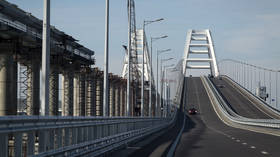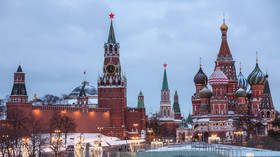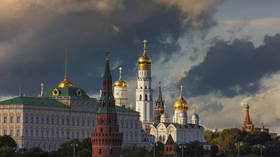Russia to build billion-dollar highway to Crimea: next part of $7.7 billion road-links project

When Russians go on vacation, the two most popular destinations are Crimea and the Krasnodar region. However, getting from one to the other has never been an easy task.
Despite plans existing since 1903, it took until 2018 for a road bridge linking the adjacent destinations. It's Europe's longest at almost 17km. Now, Moscow plans a $1.5 billion (100 billion rubles) highway to dramatically cut journey times. The first section will be 68km long and is slated to cost almost 60 billion rubles ($919 million), with the length of the entire route eventually reaching 119km.
The project is part of a series of investments in connecting Crimea to 'mainland' Russia, spending on which has reached $7.7 billion (500 billion rubles), according to daily newspaper Vedomosti. This includes the construction of the Kerch Strait bridges themselves, which cost 228 billion rubles (3.48 billion). Meanwhile, 166 billion rubles ($2.53 billion) were also allocated to the 250-kilometer Tavrida highway, which continues from the bridge into the peninsula itself.
The ever-increasing demand to visit Crimea has taken its toll on the current infrastructure, with roads being unable to cope with the mass flow of cars, especially in the summer — about 36 thousand vehicles per day.
The development of the new route will reduce the travel time from Krasnodar to the bridge from 2 hours 40 minutes to 1 hour 50 minutes, and offer increased capacity. Initially, officials planned to reconstruct existing roads, but it was determined to be cheaper to build a brand new one.
Krasnodar is Russia's fastest-growing city, attracting large amounts of migrants because of its warm climate. The eponymous region hosts 17 million visitors annually and includes 2014 Olympic host city Sochi, as well as resorts such as Gelendzhik and Anapa.
There are currently two roads leading from Krasnodar to Crimea, and the construction of a new highway will help relieve congestion on routes passing through other towns. The current shortest and most popular way, which passes through Slavyansk-on-Kuban, is about 150km long. As it goes through residential areas in different settlements, the average speed along the route is about 60 km/h. The brand-new four-lane highway will have an estimated average speed of 120 km/h.
2019 was a record year for tourism in Crimea, with over 7 million people choosing to holiday on the peninsula, according to Deputy Chairman of Crimea's Council of Ministers and Permanent Presidential Envoy Georgy Muradov. In 2020, tourist numbers are expected to surpass 8 million.
Also on rt.com Long-awaited train traffic opens on Crimea Bridge as Putin becomes first passenger (VIDEO)Think your friends would be interested? Share this story!















